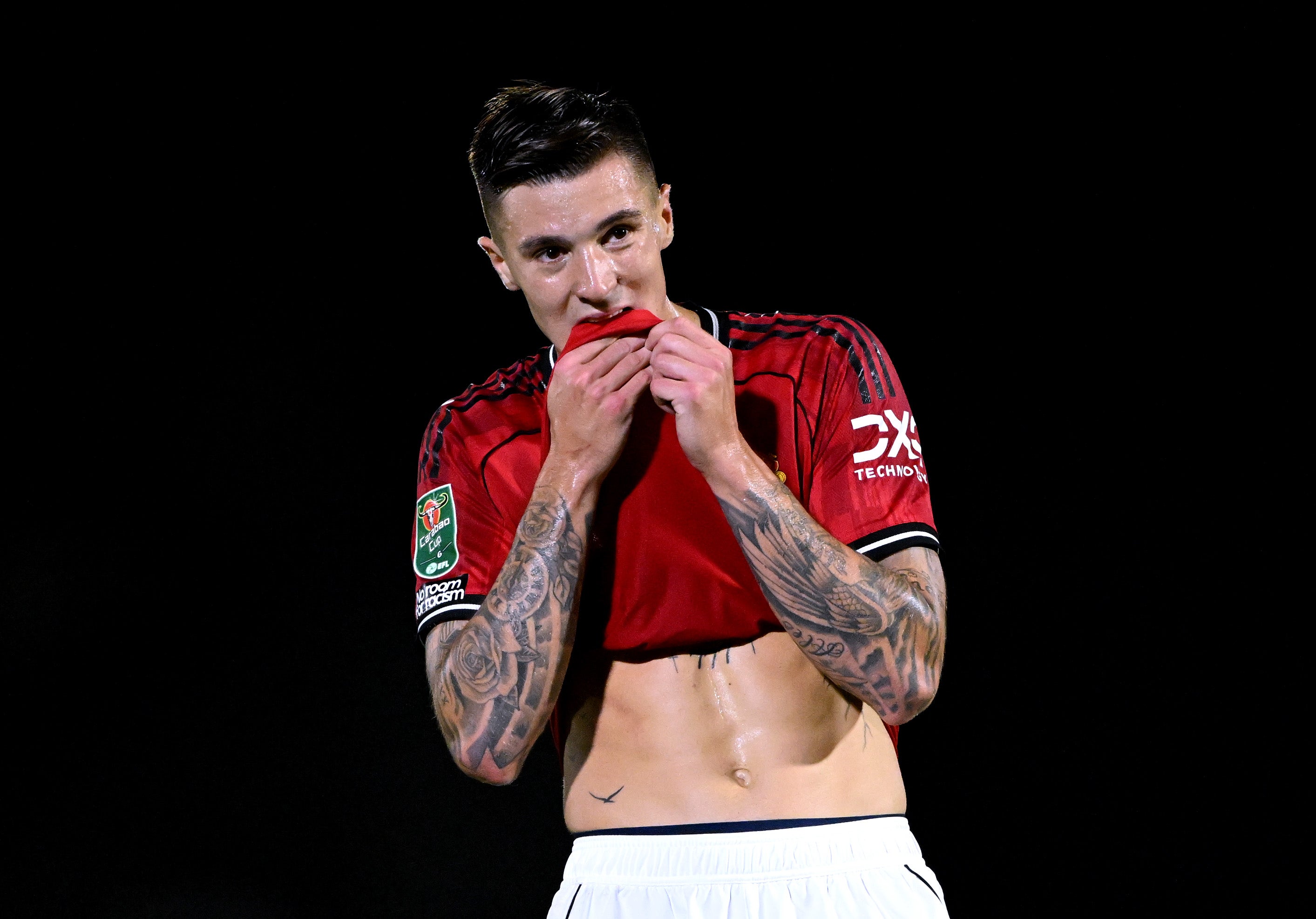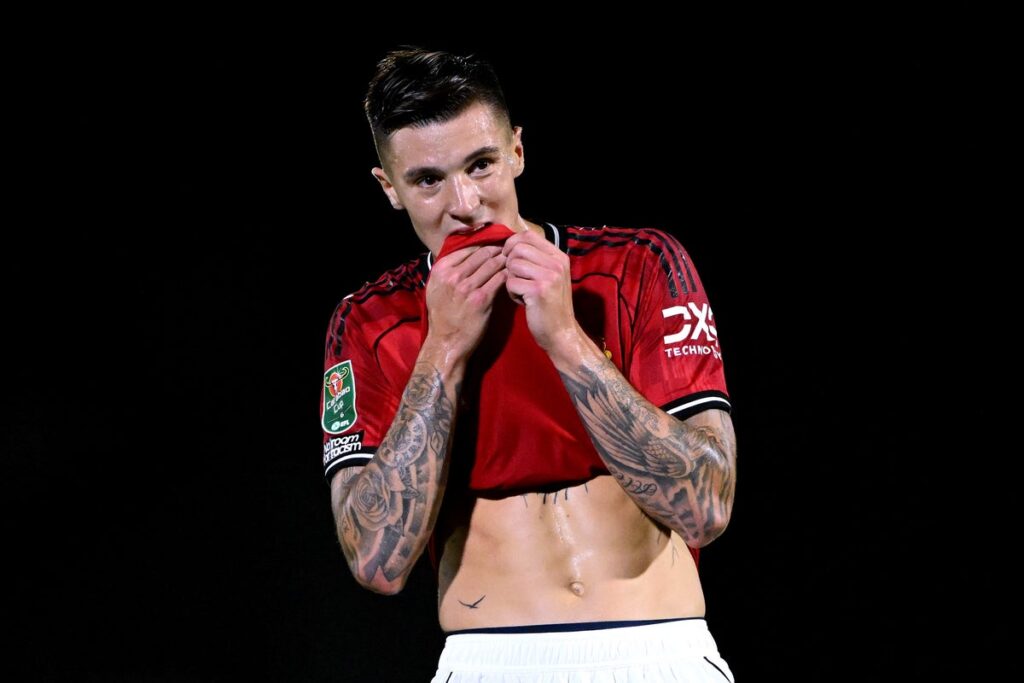For the second time in four days, Benjamin Sesko was the last in line. The final outfield Manchester United player to take a penalty in the shootout at Grimsby, the 20th out of 20, was the last attacking change made by Ruben Amorim against Burnley. Even when first Matheus Cunha and then Mason Mount went off injured, Sesko lingered unused, overlooked as Amorim sent for Joshua Zirkzee and then Kobbie Mainoo, a misfit and a midfielder respectively.
He was the £66m spectator; until Burnley equalised for a second time, anyway, and Sesko made his third Premier League appearance: all as a substitute, none yielding a first United goal. If Bruno Fernandes’ 97th-minute winner probably came as a relief to Amorim, it should have done to his biggest buy as well. Sesko had headed a Bryan Mbeumo cross over the bar and a Diogo Dalot centre wide. They might have been misses that cost two points. Instead, he merely ratcheted up the drama. But while Sesko had a 100 percent record from 12 yards before joining United, scoring 11 from 11 for clubs and country, it was unsurprising he wasn’t on spot-kick duties.
Sesko has been the bit-part big buy. If a 6ft 5in forward was signed partly for his physicality, Amorim argued that the Slovenian’s body was a reason he was relegated behind Matthijs de Ligt in the penalty takers and was the last throw of the dice on Saturday.
“It’s connected,” he said. “So he finished the [Grimsby] game with cramps, really in the limit. That’s why we protected Ben from the penalties. And that was that reason also, because Zirkzee is also a striker, he’s an international striker. But I was thinking that Ben, during the pre-season, didn’t do 90 minutes.
“And he did that, even against a fourth-division team on Wednesday. And with the problem of Cunha, you don’t know if that full game in the middle of the week has something to do with the injury today. With the problem with Mason Mount, I was not risking another player, not knowing if they are able to play so many minutes. So everything was connected. The penalty, the game on Wednesday, and the number of minutes that I was thinking to put Ben today.”
But very different things can both be true. Sesko is short of sharpness, looking rusty. He has also had an unimpressive start. Across his outings against Arsenal, Fulham and Burnley, he has had four efforts, none on target. He had six shots at Grimsby, and probably should have scored one. He ended with an xG of 0.7, but no goal. He has scored fewer times for United this season than Fulham’s Rodrigo Muniz and Burnley’s Josh Cullen.

None of which means his United career is automatically doomed to failure. Sesko could note that, though each missed in the shootout at Blundell Park, Cunha and Mbeumo started better, but with the benefit of a pre-season. The Cameroonian has scored in his last two games. He has added another dimension with a capacity to stretch defences.
And there are three pertinent comparisons for Sesko: with his new teammates, United’s past strikers and the summer’s other attacking signings. Amorim’s selection decisions may be shaped by injuries that could give Sesko a path into the team but Mount can now look fundamental to the front three, with his movement and intelligence, bringing into doubt the assumption the trident at the top would be the £200m trio of new signings.
Then there is reality that many a talismanic United forward has scored on their debut – as Wayne Rooney, Bobby Charlton, Denis Law, Ruud van Nistelrooy, Marcus Rashford and Ole Gunnar Solskjaer did – or very early on. There have been false dawns, too, like Zirkzee and Antony but there are other cautionary tales.
Rasmus Hojlund endured a three-month wait for his first league goal. He cost a similar fee – £64m, possibly rising to £72m, whereas Sesko is £66m, perhaps going up to £73m – and were born within a few months of each other in 2003. But as Sesko arrives, Hojlund could go, moving from the future to the past with brutal speed, his value dropping, his reputation damaged by two years at Old Trafford. It doesn’t mean Sesko will suffer the same fate; but United’s recent history suggests he could.
And in this, the summer of the striking signing, some of his peers have been rather quicker to get off the mark. Viktor Gyokeres, the man Arsenal signed instead of Sesko, delivered a double on his home debut. Hugo Ekitike, another to reject Newcastle for 20-time champions from the north-west, began by scoring a goal a game. Joao Pedro was prolific from the off in different competitions on different continents.
Once again, Sesko looks the odd man out. United could point out they bought him for a decade, not a month. He could do with his next month being rather better. After the cramps, Sesko would rather he proved a shooting pain for opponents.
Read the full article here


